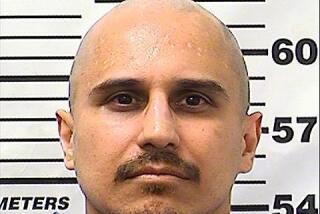Insult Led to Teen’s Slaying, Prosecution Claims
- Share via
Despite his attempts to discredit witnesses in the case, murder defendant Marcus Moralez is the one who lied about fatally shooting a Rio Mesa High School football player three years ago, a prosecutor argued Monday.
“Who is he?” Deputy Dist. Atty Susan Aramesh asked, referring to Moralez, during closing arguments in Ventura County Superior Court. “Why would he be worthy of all these ... witnesses risking their lives to pin a murder on him?”
Moralez, 22, an El Rio gang member, is charged with murder, street terrorism and carrying a loaded firearm in connection with the slaying of 17-year-old Frank Miramontez on Dec. 23, 1999. Miramontez, who was not a gang member, was shot four times in the head while sitting at the wheel of his parked car on a street in El Rio.
If convicted of first-degree murder, Moralez faces a maximum sentence of 25 years to life in prison. He also faces gang and weapons charges that could add time to his sentence.
The defendant has testified that he was not present during the shooting, and that two fellow gang members who testified in the case were trying to implicate him in Miramontez’s slaying to avoid prosecution themselves.
In his closing arguments, defense attorney Willard Wiksell underscored this point, saying the case against Moralez is weak and hinges on the testimony of gang members and jailhouse informants who were shielded from prosecution.
“The defendant, as bad as the prosecution wanted to make him ... is simply not guilty,” Wiksell said. “This case is nothing more than the people’s best guess.”
Prosecutors allege that Moralez killed the young athlete to steal his car stereo, elevate his status in his gang and avenge a perceived insult from Miramontez.
During the trial, former gang members Louie Gutierrez and George Navarro told the jury that Miramontez agreed to take them and Moralez for a drive after they offered him gas money.
Gutierrez testified that when Moralez produced a six-pack of beer, Miramontez told them not to drink in his car. A short time later, Gutierrez said, Moralez gave Miramontez driving directions, which the athlete ignored, and that is when the defendant pulled out a small handgun and fired from the back seat.
Navarro offered similar testimony, but he did not identify the shooter. He testified that from his vantage point in the front seat, he could not see who fired the shots.
Aramesh argued Monday that Moralez became upset because he felt Miramontez didn’t respect him.
“To have somebody like Frankie Miramontez, who’s a nobody in their world, to have him insult you in front of two youngsters who look up to you, is the ultimate act of disrespect,” Aramesh said.
Aramesh played a recording in which Miramontez admitted his involvement in the crime to a jailhouse informant.
But Wiksell said none of the witnesses can be trusted and stressed the lack of physical evidence such as bloody clothing, DNA, or even a murder weapon. He also claimed the prosecution never proved a clear motive for the killing, dismissing the argument that the desire to steal the car stereo and the apparent insult provoked it.
“Their theory changes as often as they put on defense witnesses,” he said. He suggested that any of the gang members in the car could have been charged with the killing, but for whatever reason, the district attorney’s office focused on Moralez.
More to Read
Sign up for Essential California
The most important California stories and recommendations in your inbox every morning.
You may occasionally receive promotional content from the Los Angeles Times.













